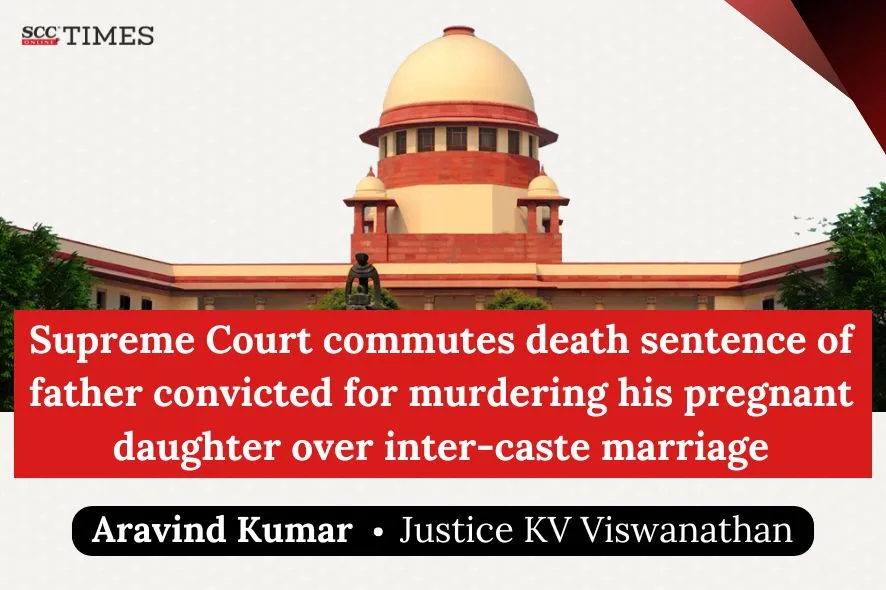Supreme Court: While considering the instant appeal challenging Bombay High Court’s decision confirming death sentence to the appellant for murdering his pregnant daughter, the Division Bench of Aravind Kumar* and KV Viswanathan, JJ., took note of the appellant’s lack of criminal antecedents, presence of mitigating factors, medical reports and satisfactory behaviour with the prison inmates and opined that even though the crime committed by the appellant is unquestionably grave and unpardonable, it is not appropriate to affirm the death sentence that was awarded to him. Hence the Court was in favour of converting the death penalty to fixed sentence during which period the appellant would not be entitled to apply for remission.
Thus, the Court confirmed the appellant’s conviction, but death penalty imposed under Section 302, IPC, was converted to 20 years of rigorous imprisonment without remission.
Background:
The appellant’s daughter performed an inter-caste marriage against the wishes of her father. It was stated by one of the prosecution witnesses that the appellant had killed his daughter, who was in her 9th month of pregnancy, by strangulating her with a rope.
After due investigation, the charge-sheet came to be filed against appellant under Sections 302, 316 and 364 of IPC. The case was committed to the Court of Session. The Trial Court framed charges against the appellant for offences punishable under Section 302, 316 and 364 of IPC and after pleading not guilty, he came to be tried for the aforesaid offences.
To prove the charges against the accused, the prosecution examined 10 witnesses. The case of the accused was of a total denial, and he did not examine any witness in support of his defense. The Trial Court, after appreciation of the facts and evidence on record, convicted the appellant for the offences punishable under Sections 302, 316 and 364 of IPC and sentenced him to death.
By the impugned judgement and order, Bombay High Court affirmed the reference made by the Trial Court and confirmed the death penalty and sentences awarded by the Trial Court.
Aggrieved by the decision of High Court, the appellant preferred the instant appeal.
Contentions:
Counsel for the appellant contended that both the Trial Court and the High Court have erred in convicting the appellant for the offences punishable under Sections 302, 316 and 364 IPC. The motive for killing the deceased was not proved. The prosecution witness’ statement that appellant was angry with the deceased as she got married out of caste, is a vague statement and without basis. It was further submitted that deceased was married for over a year, and it was unexplained by the prosecution as to why the appellant would wait for a year to commit the offence and that too in a public place.
Per contra, the respondent argued that impugned judgement and order of the High Court is well reasoned and has been passed after considering the entire facts and circumstances and same is not to be interfered with by this Court in exercise of jurisdiction vested under Article 136 of the Constitution. It was also submitted that this is a fit case to award death sentence and the case would fall into the “rarest of the rare case” and that the balance of mitigating and aggravating circumstances would not lie in favour of the appellant and he has committed a heinous crime by killing his own daughter who was in advanced pregnancy stage in a merciless manner.
Court’s Assessment:
The Court pointed out that the testimonies of the prosecution witnesses fortified the case of the prosecution vis-a-vis the motive of the appellant for commission of the crime. Examining the testimony of eyewitness relied upon by the prosecution, the Court noted that it clearly fortified the case of the prosecution. Furthermore, the Court observed that statements of the prosecution witnesses were properly corroborated.
The Court further pointed out that Section 103 of the Evidence Act, mandates that burden of proof as to any particular fact lies on that person who wishes the Court to believe in its existence. As such, burden was on the appellant to tender evidence for the purpose of proving the alleged financial transaction between himself and the prosecution eyewitness.
The Court thus observed that the chain of events establishes the guilt of the appellant beyond reasonable doubt and there are no other circumstances to disbelieve the theory of the prosecution.
Therefore, the Court opined that Bombay High Court did not commit any error in upholding the conviction of the accused for the offences punishable under Sections 302, 316 and 364 IPC.
Considering whether capital punishment for the appellant was the appropriate sentence based on the facts and circumstances of the case, the Court deliberated whether the instant case would fall in the category of “rarest of rare case” so as to confirm the death penalty or the sentence can be commuted.
The Court took note of the report by Superintendent of District Jail, Yervada, that the 47-year-old appellant’s conduct and behaviour is satisfactory with other inmates and prison staff. Similarly, probation officers also reported that appellant was not involved in any criminal activity in jail for the past 6 years and his behaviour with jail staff and inmates is satisfactory.
The Court took further note of the appellant’s Mitigation Investigation Report, psychiatric assessment report, cardiological evaluation report and neurological evaluation revealing several health issues that require continuous medical management.
The Court found that the instant case did not fall into the category of “rarest of rare cases” wherein it can be held that imposition of death penalty is the only alternative. The Court opined that the present case would fall in the category of “middle path”.
The Court stated that the appellant hails from a poor nomadic community in Maharashtra. He had an alcoholic father and suffered parental neglect and poverty. He dropped out of school when he was 10 years old and was forced to start working to support his family, doing odd jobs. All efforts put by the appellant to bring his family out of poverty did not yield desired results. Neither the appellant nor any of his family members have any criminal antecedent. It cannot be presumed that appellant is a hardened criminal who cannot be reformed. Hence, it cannot be said that there is no possibility of reformation, even though the appellant has committed a gruesome crime.
The Court observed that the doctrine of “rarest of rare” requires that death sentence should not be imposed only by taking into consideration the grave nature of crime but only if there is no possibility of reformation by a criminal. “Being conscious of the fact that sentence of life imprisonment is subject to remission, which would not be appropriate in view of the gruesome crime committed by the appellant, the course of middle path requires to be adopted in the instant case”.
Upholding the appellant’s conviction, the Court deemed it fit to commute the death penalty to 20 years’ rigorous imprisonment without remission. The Court clarified that the appellant shall not be entitled to make any representation for remission till he completes 20 years of actual rigorous imprisonment.
CASE DETAILS
|
Citation: Appellants : Respondents : |
Advocates who appeared in this case For Petitioner(s): For Respondent(s): |
CORAM :









